Reporter Jackie Keogh spoke to two women who have found themselves at the mercy of the rental sector in a cruel housing crisis that is also affecting their age group, as well as younger home-seekers
THE independent TD Michael Collins has described as ‘an alarming trend’ the number of older people struggling to make ends meet and pay their rent in the region.
‘A lot of older people are at their wits’ end,’ he said, ‘because eviction is either hanging over them, or has actually happened.’
‘These would be people in their 60s, 70s and 80s on fixed incomes, who have no room for flexibility when they are hit by rent increases,’ he said.
The Southern Star met Caroline Clarke (72) in Schull, after she asked Deputy Collins for assistance in trying to find another place, any place, to live.
She confirmed that her landlords had been exemplary but they said that they needed the house back for a relative relocating from Dublin.
Meanwhile, issues like marriage breakdown, the exodus from costly urban dwellings to more affordable rural areas, rising energy costs, and people with colossal medical bills, are all adding to turmoil in the rented sector.
Both Caroline and her husband, who is 77, are still fit and they say they have no wish to be a burden on the State.
‘I don’t want to go into an old person’s home,’ said the artist.
Caroline believes the government – which is taking substantial taxes from landlords – needs to reassess its housing policies as a matter of urgency.
She said it needs to build independent housing for the elderly because people – aged between 60 and 80 – are already being affected.
‘Ireland has an ageing population,’ she said, ‘and unless something is done about it now, it will be a hell of a burden on the next generation.’
With the urging of her local TD, Caroline put her name on the local authority housing list because trying to find something on the open market was proving ‘a near impossibility’.
With most landlords in the private sector asking €1,400 per month, Caroline said rentals are way out of the average person’s income.
They, as a couple, do not have, nor have they applied for, the local authority’s housing assistance payment (Hap).
But current rents are far in excess of what they could afford on her husband’s OAP pension from the States and her two-thirds pension from the UK.
‘We were lucky to have the support of wonderful friends and our local TD,’ she said, ‘and, in the end, it was a dear friend who found us a small cottage in Skibbereen.
The owners are, she added, understanding of our need to care for our disabled rescue cats MacAvity, Al, and their three-legged feline Wellie.
Caroline said she had previously owned a little place in Kinsale but sold it before moving to the UK and US.
She and her husband invested the money into a pension fund in the hope of using the money to purchase their retirement home in Ireland.
When that pension scheme collapsed, she said they had no recourse, legal or otherwise.
Worse was about to happen when, in 2008, she was diagnosed with Lynch syndrome – a mutant gene that can cause cancer anywhere in the body.
Without a trace of self-pity, she confirmed that she had a series of costly operations including three for colon cancer, the removal of a brain tumour, as well as a gallbladder full of polyps. She also had carcinoma surgically removed from her face.
As a person who finds self-pity and overt sympathy abhorrent, Caroline said: ‘My approach is to confront things as they come to me. I take things on board and do something about them. That stems from being a cancer survivor – you know you can take on pretty much anything and survive.
‘The important message in all of this,’ she said, ‘is that this could happen to anyone – young or old – so people need to have that awareness.
‘No one knows if the mortgage rates are going to go through the roof, or what else may strike. Sometimes people go through circumstances and the wheels fall off.’
Meanwhile, a woman in her 60s in Rosscarbery said she, too, cannot afford the rental prices, even with the assistance of the local authority’s Hap.
As someone who is not into technology, she said she has had to learn fast how to use the Council’s choice based letting process in the hopes of securing a two-bedroom house at a rent she can afford.
Almost a decade ago, she said she had been allocated a Council house, but a family situation forced her to move to a private, rented property in a different location.
After working for a long number of years before developing a health issue, she said that her biggest regret in life is that she didn’t buy a house.
Now, she said, she is living on the tightest of margins – sometimes finding that within a day or two of receiving her social welfare payment, she has no money left at all.
She said facing eviction at the end of November had caused her to experience severe depression and she is now appealing to the Council to come to her aid.
Patrick Healy, spokesperson for housing organisation Novas, said that in 2022 so far, they have worked with 140 households and 7% of these households are over 60.
‘There has been a steady figure over the past few years. Behind each statistic, however, there are human experiences. No one within the private rented market is immune to the impacts of housing and homeless crisis. What we have seen locally and nationally is a steady contraction of landlords from the private rented sector – this affects all ages.
‘In rural communities, so much can be gained from connections and social capital. However, many of our clients express a deep sense of stigma, shame, and trauma when experiencing homelessness in a rural area. This can have a significant isolating and debilitating impact.
‘There are specific risks that can affect older people when experiencing homelessness. Homelessness can lead to health difficulties and can compound already existing health issues. If a person has been embedded and connected to an area for much of their life, it can be unimaginable for someone to consider having to move or access private emergency accommodation in another area or region.’









